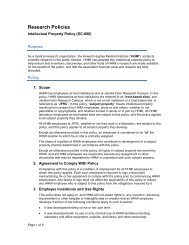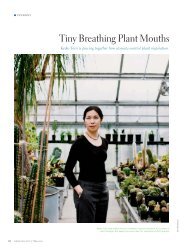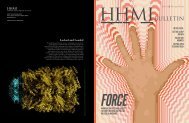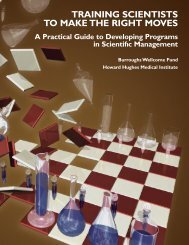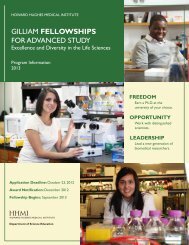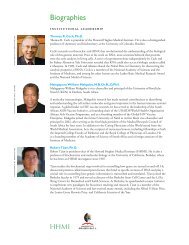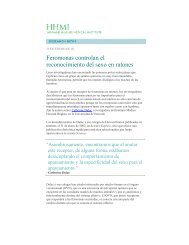Writing a Letter of Recommendation - Howard Hughes Medical ...
Writing a Letter of Recommendation - Howard Hughes Medical ...
Writing a Letter of Recommendation - Howard Hughes Medical ...
Create successful ePaper yourself
Turn your PDF publications into a flip-book with our unique Google optimized e-Paper software.
<strong>Writing</strong> a <strong>Letter</strong><br />
<strong>of</strong> <strong>Recommendation</strong><br />
Addendum to<br />
Making the Right Moves:<br />
A Practical Guide to Scientific Management<br />
for Postdocs and New Faculty<br />
second edition<br />
Burroughs Wellcome Fund<br />
<strong>Howard</strong> <strong>Hughes</strong> <strong>Medical</strong> Institute
Making the Right Moves: A Practical Guide to Scientific Management for Postdocs and<br />
New Faculty, second edition<br />
© 2006 by the <strong>Howard</strong> <strong>Hughes</strong> <strong>Medical</strong> Institute and Burroughs Wellcome Fund<br />
All rights reserved.<br />
“<strong>Writing</strong> a <strong>Letter</strong> <strong>of</strong> <strong>Recommendation</strong>”: Electronic addendum published 2009<br />
Writer: Laura Bonetta, Ph.D.<br />
Production: Martine Bernard Design<br />
Permission to use, copy, and distribute this publication or excerpts is granted provided<br />
that (1) the copyright notice above appears in all reproductions; (2) use is for noncommercial<br />
educational purposes only; and (3) the publication or excerpts are not modified in<br />
any way (except when used for noncommercial educational purposes). Requests beyond<br />
that scope should be directed to labmgmt@hhmi.org.<br />
The views expressed in this publication are those <strong>of</strong> its contributors and do not necessarily<br />
reflect the views <strong>of</strong> the <strong>Howard</strong> <strong>Hughes</strong> <strong>Medical</strong> Institute or the Burroughs Wellcome<br />
Fund.<br />
This publication is available online at http://www.hhmi.org/labmanagement.<br />
Burroughs Wellcome Fund<br />
21 T.W. Alexander Drive<br />
P.O. Box 13901<br />
Research Triangle Park, North Carolina<br />
27709-3901<br />
http://www.bwfund.org<br />
<strong>Howard</strong> <strong>Hughes</strong> <strong>Medical</strong> Institute<br />
4000 Jones Bridge Road<br />
Chevy Chase, Maryland 20815-6789<br />
http://www.hhmi.org
WRITING A LETTER OF<br />
RECOMMENDATION<br />
As a beginning independent investigator, chances are you will soon have to write<br />
a letter <strong>of</strong> recommendation on behalf <strong>of</strong> a student, a postdoc, or even a colleague.<br />
Your job as letter writer will be to describe the candidate’s strengths and weaknesses<br />
as they relate to the position or program in a way that is both thoughtful<br />
and personal. A letter that falls short <strong>of</strong> this goal will be <strong>of</strong> little value to those<br />
evaluating applications and will not help the candidate get what he or she is after.<br />
So, it pays to put in the necessary effort and time to write a “good” letter. This<br />
chapter provides insights and advice from experienced investigators on how to<br />
do so. It is not meant to be prescriptive but rather to <strong>of</strong>fer some suggestions from<br />
which you can pick and choose.<br />
BEING ASKED TO WRITE A LETTER<br />
<strong>Letter</strong>s <strong>of</strong> recommendation are ubiquitous in an academic research career. If<br />
you teach one or more senior-level undergraduate courses or have undergraduate<br />
students in your laboratory, you might have to write dozens <strong>of</strong> letters a year as<br />
students become graduate-school bound or look for employment. If you do not<br />
teach undergraduates and have primarily graduate students and postdocs in your<br />
lab, you will have significantly fewer letters to write—maybe for only one or two<br />
people each year.<br />
In addition to the people in your own lab, graduate students and postdocs in<br />
your department may ask you to write letters for them when they apply for fellowships<br />
or seek new positions. Colleagues might also ask you to write letters <strong>of</strong><br />
recommendation on their behalf for various promotions or awards, but that may<br />
not happen too <strong>of</strong>ten until you are more established.<br />
For Whom Should You Write?<br />
As a mentor, you have an obligation to support students and postdocs in your lab<br />
in their job search and to help them find a good match for their abilities and aspirations.<br />
If they ask you to write a recommendation letter, it is customary to support<br />
them in this way. The best thing to do is to sit down with them and discuss<br />
their plans before they start applying for jobs. If their career goals are unrealistic,<br />
talk about what they need to do to become more competitive or help steer them<br />
BWF ♦ HHMI 1
Making the Right Moves A Practical Guide to Scientific Management<br />
in a different direction. If you do end up writing a letter for someone in your lab<br />
for a job you don’t think is a good fit, there are ways to put a positive spin on the<br />
negative (see page 6, “<strong>Writing</strong> a ‘Not-So-Enthusiastic’ <strong>Letter</strong>”). If people who are<br />
not part <strong>of</strong> your lab ask you to write a letter for them, it is up to you to decide<br />
whether to do so.<br />
Reasons to Turn Someone Down<br />
You should write a letter <strong>of</strong> recommendation only if you can honestly write a<br />
supportive letter for someone for a given position. After all, a letter <strong>of</strong> recommendation<br />
is supposed to be a tool for helping people obtain what they are after.<br />
If you don’t know the candidate well enough to write a good letter, let the person<br />
know. He or she will probably ask someone else.<br />
If you do know the candidate well but have some reservations, let the person<br />
know about your concerns, and leave it up to him or her to decide whether you<br />
should still write the letter.<br />
PREPARATION<br />
Read Some Sample <strong>Letter</strong>s<br />
If you have never written a letter <strong>of</strong> recommendation before, read a stack <strong>of</strong><br />
reference letters to see what works and what doesn’t. Most faculty have access to<br />
graduate student applications and the letters submitted. Junior faculty can also<br />
ask their more experienced colleagues to share “sample” letters they have written<br />
or have received from applicants (blocking out names and other personal information).<br />
The resource section <strong>of</strong> this chapter provides links to sample letters.<br />
Collect Information<br />
Once you know what a letter <strong>of</strong> recommendation looks like, make sure you find<br />
out as much as possible about the candidate for whom you are writing. One <strong>of</strong><br />
the worst things you can do is to write a letter that is too generic.<br />
Ask for the following information:<br />
Tip: When reading a sample recommendation<br />
letter, try to put yourself in the position <strong>of</strong> whoever<br />
is going to read it, keeping in mind that you<br />
could be reading the letter late at night or when<br />
you are pressed for time. Ask yourself which letters<br />
stand out and then use them as models for<br />
your own letters.<br />
♦ For people in your lab—you probably<br />
already have a current curriculum<br />
vitae (CV), but also ask for as<br />
complete a description as possible <strong>of</strong><br />
the position or program for which<br />
the person is applying.<br />
2 BWF ♦ HHMI
<strong>Writing</strong> a <strong>Letter</strong> <strong>of</strong> <strong>Recommendation</strong><br />
♦ For people who are not in your lab—ask for a current CV that includes<br />
the dates and locations <strong>of</strong> their training and a list <strong>of</strong> publications as well<br />
as copies <strong>of</strong> any papers that are in press or that have been submitted.<br />
♦ For people who were in your lab but have since moved on—ask for a<br />
written summary <strong>of</strong> their current work, future plans, and why they are<br />
interested in the position for which you are writing the letter.<br />
♦ For students who are not in your lab or department but who were in one<br />
<strong>of</strong> the classes you taught—ask for transcripts and check your class records.<br />
Many reference writers find it helpful to meet with the person who has requested<br />
the letter <strong>of</strong> recommendation. In such a meeting you can learn about the person’s<br />
long-term career goals and how his or her current research and other activities relate<br />
to these goals. Ask about the programs<br />
or positions for which letters are being<br />
Tip: Don’t ask the candidate to write a draft <strong>of</strong><br />
the letter for you. Most heads <strong>of</strong> labs say this rarely<br />
saves time and sometimes leads to a weaker letter.<br />
It is better for the candidate to provide you with<br />
all the necessary information, from which you can<br />
then pick and choose as you write your letter.<br />
requested and what the individual’s preference<br />
is and why. You should also discuss<br />
the candidate’s strengths and weaknesses<br />
as they relate to these positions.<br />
If you cannot have a face-to-face meeting,<br />
ask the candidate for a detailed written<br />
description <strong>of</strong> these issues.<br />
Allot Sufficient Time to Write and Send the <strong>Letter</strong><br />
Once you have gathered the data and marked the deadline on your calendar,<br />
make sure you set aside enough time to write the letter. It can take one to two<br />
hours, sometimes longer, to craft a well-written letter for one individual. (It takes<br />
less time to tweak this initial letter for different programs or positions the same<br />
individual has applied to.)<br />
The candidate should give you clear instructions on how and where to send the<br />
letter. Some letters have to be submitted online, some e-mailed, and others sent<br />
by snail mail.<br />
WHAT THE LETTER SHOULD SAY<br />
Keep the following pointers in mind when you craft your letter.<br />
Introduce Yourself and the Candidate<br />
Begin the letter by describing how you know the candidate. Briefly state your<br />
own qualifications so that people who don’t know you can decide whether to<br />
BWF ♦ HHMI 3
Making the Right Moves A Practical Guide to Scientific Management<br />
trust your judgment. But don’t go overboard and make the letter about yourself!<br />
For example, “During my years <strong>of</strong> training as a postdoc and now as a faculty<br />
member, I have worked with and personally trained more than xx graduate<br />
students in laboratories at the University <strong>of</strong> Michigan, Harvard <strong>Medical</strong> School,<br />
and, currently, at Emory University. In my opinion, candidate x is among the<br />
top 5 percent <strong>of</strong> the graduate students I have known.” (You may want to include<br />
students you trained as a postdoc, if you have not yet had many students in your<br />
own lab.)<br />
Present the Candidate Truthfully but Positively<br />
Devote several paragraphs to discussing the candidate’s scientific work and<br />
personality, following the suggestions below.<br />
Be specific. Give meaningful examples <strong>of</strong> achievements and provide stories or<br />
anecdotes that illustrate the candidate’s strengths. Don’t just praise by using generalities<br />
(such as “quick learner”), but say what the candidate did to give you that<br />
impression. These details will show you have a strong relationship and also bring<br />
the candidate alive on the page. If the candidate works in your laboratory, make<br />
sure the letter talks about his or her specific contributions to the lab’s research.<br />
♦ “Student x is the first person to successfully master in vivo imaging in my<br />
laboratory and did all the trouble-shooting calibration and testing completely<br />
independently.”<br />
♦ “Student x is the first student in my lab to have a first-author Cell paper.<br />
She contributed data for five <strong>of</strong> the figures and made an important<br />
intellectual contribution to the experimental design and to writing the<br />
discussion.”<br />
♦ “Candidate x’s research was submitted as an abstract and was accepted for<br />
a podium presentation at the American Association for Cancer Research<br />
national meeting earlier this year. Although<br />
she is an undergraduate student,<br />
I treated candidate x in the same manner<br />
I would treat an experienced graduate<br />
student by having her prepare and present<br />
the talk independently. At the meeting,<br />
she presented the work and answered all<br />
the questions from the audience in a clear<br />
and pr<strong>of</strong>essional manner. After the talk<br />
several scientists came up to express how impressed they were with the<br />
presentation.”<br />
Tip: Don’t make the letter too short, because<br />
it will give the reader a negative impression <strong>of</strong> the<br />
candidate. <strong>Letter</strong>s <strong>of</strong> recommendation should be<br />
between one and two pages.<br />
4 BWF ♦ HHMI
<strong>Writing</strong> a <strong>Letter</strong> <strong>of</strong> <strong>Recommendation</strong><br />
You don’t just have to describe the candidate as he or she is right now—you can<br />
discuss the development the person has undergone.<br />
♦ “When candidate x came to the lab he showed promise but was not able<br />
to plan experiments effectively. Through his own hard work he has acquired<br />
this skill and has become an excellent scientist.”<br />
Quantify and compare. Find a way to quantify the candidate’s abilities, especially<br />
with respect to other scientists who have achieved success in the field and<br />
who the letter reader might know. Many letter writers rank the applicants according<br />
to their own measure <strong>of</strong> what makes a good researcher, graduate student, or<br />
technician. Depending on the position, most people rank candidates according to<br />
a combination <strong>of</strong> research strength, leadership skills, writing ability, oral communication,<br />
teaching ability, and collegiality.<br />
♦ “There are currently 17 graduate students in our department and I rank<br />
candidate x as 4/17. Her bench skills are the best I have ever had in my<br />
own lab, but she still needs to develop better communication skills.”<br />
Address the requirements <strong>of</strong> the position. Make sure the letter discusses the<br />
most important skills and personality traits needed for success in the job.<br />
♦ “I understand that you are looking for a person who will be able to establish<br />
a program to study nuclear structure and architecture using imaging<br />
technologies. Candidate x has performed similar studies using fluorescent<br />
imaging in living cells. Her mastery <strong>of</strong> these experimental techniques is<br />
demonstrated by her recent first-author publications in Journal <strong>of</strong> Cell<br />
Biology and Nature Cell Biology.”<br />
If you are writing a letter for someone applying for a position as a physicianscientist,<br />
you should comment on his or her bedside manner. For example, if you<br />
are a chief <strong>of</strong> service, comment on the candidate’s clinical skills and personality<br />
and how he or she interacts with patients.<br />
Talk about personal attributes. Does the candidate work well with others? Has<br />
she or he taught other people in the lab? Has the candidate shown motivation<br />
We look for more than research accomplishments—comments<br />
on creativity, originality, independence, and leadership are<br />
usually not overhyped and mentioned specifically in letters<br />
<strong>of</strong> the very best candidates.<br />
—Suzanne Pfeffer, Stanford University School <strong>of</strong><br />
Medicine<br />
BWF ♦ HHMI 5
Making the Right Moves A Practical Guide to Scientific Management<br />
and commitment in her or his work? Often these descriptions are what distinguish<br />
a good letter <strong>of</strong> recommendation from a great one.<br />
Make it memorable. Put something in the letter that the reader will remember,<br />
such as an unusual anecdote, or use an unusual term to describe the candidate.<br />
This will help the application stand out from all the others.<br />
Beware <strong>of</strong> what you leave out. Remember that what is not said in a reference<br />
letter can be just as important as what is said. If you don’t mention a candidate’s<br />
leadership skills or his or her ability to work well with others, for example, the<br />
letter reader will wonder why.<br />
Tip: A final statement summarizing your enthusiasm<br />
for the candidate is <strong>of</strong>ten very useful in<br />
focusing the reader’s attention on your conclusions<br />
and your excitement for candidate.<br />
Express Your Willingness to<br />
Help Further<br />
Conclude the letter by <strong>of</strong>fering to be<br />
contacted should the reader need more information<br />
or have questions. Make sure to<br />
provide your phone number and perhaps<br />
the best times to reach you.<br />
WRITING A “NOT-SO-ENTHUSIASTIC” LETTER<br />
If you write a letter for someone about whom you have some concerns—for<br />
example, the person lacks strong leadership skills or isn’t highly motivated—you<br />
can still write a generally positive letter, leaving out a mention <strong>of</strong> these qualities.<br />
This omission will send a signal to readers who will be looking for these details.<br />
A short letter will also signal that you are not overly enthusiastic about the person<br />
for this particular position. If the reviewers are interested in the candidate, they<br />
may call you for more details and you will then have the opportunity to explain<br />
your reservations.<br />
You can also mention negative things by putting a positive spin on them. For<br />
example, if someone has not published much you can say “candidate x has taken<br />
a long time to get experiments going but<br />
now has several papers in press and I think<br />
Tip: If the candidate is a good scientist but better<br />
suited, say, for a faculty position at some schools<br />
and not others, some researchers handwrite that<br />
perception on top <strong>of</strong> the standard letter to those<br />
“other” schools. This way they still help the candidate<br />
obtain a faculty job without harming their<br />
reputation for good judgment.<br />
they will make an important contribution<br />
to the field.”<br />
Yet another way to make a criticism sound<br />
less damaging is to say something like<br />
“when candidate x came to the lab his<br />
writing skills were poorly developed, but<br />
he has worked hard to improve them and<br />
has made great strides in that direction.”<br />
6 BWF ♦ HHMI
<strong>Writing</strong> a <strong>Letter</strong> <strong>of</strong> <strong>Recommendation</strong><br />
Terms like “room for improvement,” “has worked hard to,” and “made great<br />
progress in” are useful and help turn a negative into a positive.<br />
WHAT THE LETTER SHOULD NOT SAY<br />
Avoid Irrelevant Information<br />
<strong>Letter</strong>s should not mention anything that is irrelevant to doing the job, such<br />
as ethnicity, age, hobbies, marital status, and so on. A writer might want to say<br />
things like “candidate x understands how important it is to have a lab team that<br />
functions well and has organized several social events for the lab that have helped<br />
make it both productive and happy” to show that the person is social and easy to<br />
get along with. That is something that might be important to the job. In some<br />
cases, personal information may illustrate the ability to persevere and overcome<br />
adversity, qualities that are helpful in research.<br />
But statements like “candidate x is very religious and has demonstrated religious<br />
fervor uncommon for someone his age” has no bearing on whether someone will<br />
do well in graduate school or in a job.<br />
Personal information may be revealed if it helps explain a weakness in someone’s<br />
application. For example, sometimes there are acceptable circumstances for a gap<br />
in someone’s publication record—perhaps a medical condition or a family situation<br />
kept that person out <strong>of</strong> the lab for a period <strong>of</strong> time. It is okay to explain that<br />
in the letter <strong>of</strong> recommendation but only after discussing it with the candidate.<br />
Another example <strong>of</strong> a personal situation that might warrant discussion would<br />
be a case in which a postdoc is not able to ask his or her advisor for a letter <strong>of</strong><br />
recommendation because <strong>of</strong> a bad relationship. If you, as the letter writer, know<br />
about this situation, you might want to mention in the letter that “there was a<br />
personality conflict but it does not reflect on the ability <strong>of</strong> the candidate to do<br />
the job.”<br />
Don’t Say Anything That Is Not True<br />
Obviously, all information in a letter <strong>of</strong> recommendation should be, to the best<br />
<strong>of</strong> your knowledge, accurate. But sometimes letter writers stretch the truth to<br />
make a candidate sound better than he or she really is, thinking it is helpful.<br />
This strategy can backfire. According to a member <strong>of</strong> a recent search committee,<br />
the head <strong>of</strong> one lab wrote letters for three applicants from his lab, and in each<br />
letter he stated that the applicant was “the best postdoc ever in my lab.” Most<br />
researchers say that the most effective letters they receive include some weakness<br />
to balance the strengths.<br />
BWF ♦ HHMI 7
Making the Right Moves A Practical Guide to Scientific Management<br />
You don’t help the candidate by overhyping them.You<br />
should write strongly and specifically about someone who is<br />
really excellent (say how and why they are special). But it’s<br />
okay to write a balanced letter, even for the top folks.<br />
—Suzanne Pfeffer, Stanford University School <strong>of</strong><br />
Medicine<br />
BE AWARE OF GENDER BIAS<br />
Choose Your Words Wisely<br />
Two studies have shown that there may be some differences in the choice <strong>of</strong><br />
words used in letters for male and female scientists. Both Trix and Psenka (2003)<br />
and Schmader, Whitehead, and Wysocki (2007) found that letters for women<br />
did not contain as many “standout” adjectives—words like “superb,” “outstanding,”<br />
and “excellent”—as did letters for men. In addition, Trix and Psenka found<br />
that letters for women had more doubt-raising statements, including negative or<br />
unexplained comments.<br />
If you say that Chris works well in a team—that might be<br />
interpreted differently depending on whether Chris is male<br />
or female. Exactly the same language can convey different<br />
messages because <strong>of</strong> people’s antecedent beliefs about gender<br />
differences. The reader might infer that Chris the man is<br />
a good team leader or someone who can work well with<br />
a team even when he isn’t a leader <strong>of</strong> it. Chris the woman,<br />
in contrast, may look as if she can’t or doesn’t lead. For<br />
both men and women, then, it is good to be explicit that<br />
the person is both a good team leader and can work<br />
collaboratively.”<br />
—Virginia Valian, Hunter College<br />
Test for Possible Bias<br />
Although it is not clear what the effect <strong>of</strong> the choice <strong>of</strong> words is, it seems plausible<br />
that the words you use will affect the reader’s perception <strong>of</strong> the candidate—<br />
the stronger the words, the stronger the candidate. In an exercise conducted at<br />
8 BWF ♦ HHMI
<strong>Writing</strong> a <strong>Letter</strong> <strong>of</strong> <strong>Recommendation</strong><br />
the 2005 BWF-HHMI Course in Laboratory Management, course participants<br />
were asked to read two letters written by the same pr<strong>of</strong>essor for two postdocs<br />
in his lab, one male and one female (see<br />
appendix), with similar qualifications and<br />
Tip: Write a letter <strong>of</strong> recommendation for any<br />
candidate, male or female, and then switch all the<br />
pronouns to the opposite gender. Read the letter<br />
over and ask yourself: Does it sound odd? If it does,<br />
you should probably change the terms used.<br />
achievements. The pr<strong>of</strong>essor used more<br />
specific and descriptive language, as well<br />
as more standout adjectives, for the male<br />
candidate than for the female candidate<br />
(see summary document, appendix). As a<br />
result, course participants overwhelmingly<br />
gave the male postdoc a higher ranking<br />
than the female postdoc.<br />
ASKING SOMEONE TO WRITE A LETTER FOR YOU<br />
Many letter writers also need letters written on their behalf at some point in<br />
their careers. If you are asking someone to write a letter <strong>of</strong> recommendation for<br />
you, make sure you follow these guidelines:<br />
♦ Plan way ahead. If you want good letters <strong>of</strong> recommendation, you need<br />
to plan several years in advance. It is important to have established personal<br />
relationships with potential writers early on in your career. The best<br />
letters are the ones that come from people who say “I have known this<br />
person for x years.”<br />
Try to establish strong relationships with at least half a dozen people,<br />
some <strong>of</strong> whom should be well known in your field. People who read the<br />
recommendation letter are more likely to care about the opinion <strong>of</strong> someone<br />
who has a good reputation in the field.<br />
♦ Be specific. When you ask someone for a recommendation letter, be very<br />
specific about what you want.<br />
♦ Prepare the writers. Once your reference has agreed to write a recommendation<br />
letter for you, a good strategy is to give the person a memo<br />
that describes the job or jobs to which you are applying and the key skills<br />
or attributes and other aspects <strong>of</strong> your background that make you well<br />
suited for the job.<br />
Other documents you should provide, depending on how well the person<br />
writing the letter knows you, are a CV, any papers published and in press,<br />
and copies <strong>of</strong> academic transcripts. You should also provide parts <strong>of</strong> the<br />
application that you have had to write yourself, such as a personal essay<br />
<strong>of</strong> your career goals or a statement <strong>of</strong> your teaching philosophy. The letter<br />
writer can speak to these items if he or she has the complete application.<br />
BWF ♦ HHMI 9
Making the Right Moves A Practical Guide to Scientific Management<br />
Tip: It is usually a good idea to ask people you<br />
would like as references if they feel that they can<br />
write a “positive letter” <strong>of</strong> support for you. If they<br />
say no, it is better to know it now rather than after<br />
you don’t get the job.<br />
You may be asked to write a draft <strong>of</strong> the<br />
letter. As mentioned on page 1, many<br />
heads <strong>of</strong> laboratories say this is not a good<br />
idea. However, if you are asked to do it,<br />
do it!<br />
Make sure you provide the writers with<br />
the instructions for submitting the letter<br />
and the deadline. If letters are to be<br />
mailed, give them postage-paid addressed<br />
envelopes. Also provide any forms that are supposed to be submitted with<br />
the letter. (Make sure to complete as much information as possible on<br />
those forms so that the letter writer does not have to do it.)<br />
♦ Meet with the writers. If possible, meet with the letter writer and go<br />
through all the information you are providing. If the writer is in a different<br />
location you can talk to him or her by phone.<br />
♦ Don’t miss the deadline. Give references plenty <strong>of</strong> time to accomplish<br />
their tasks. Ideally, approach them with the request at least three weeks<br />
before the letter is due. Once you have provided all the information,<br />
remind them <strong>of</strong> the deadline and check back periodically. Reminders will<br />
not be resented.<br />
♦ Don’t argue. If someone says that they do not know you well enough or<br />
don’t have the time, don’t try to convince them otherwise.<br />
Tip: If you get the position, make sure that<br />
the reference writer knows it and then thank the<br />
person formally with a note. Who knows, there may<br />
come a time when you will want to ask this person<br />
for a recommendation letter again!<br />
Like many other tasks new faculty have<br />
to perform, writing letters <strong>of</strong> recommendation<br />
becomes easier with practice. But<br />
regardless <strong>of</strong> how many letters you write,<br />
each letter requires time and effort. Take<br />
the job seriously. Although a poorly written<br />
letter is not going to sink a career, a<br />
well-written one can make an application<br />
stand out from all the others.<br />
10 BWF ♦ HHMI
<strong>Writing</strong> a <strong>Letter</strong> <strong>of</strong> <strong>Recommendation</strong><br />
RESOURCES<br />
The Survival Skills and Ethics Program at the University <strong>of</strong> Pittsburgh provides<br />
several useful resources for graduate students, postdocs, and new faculty, including<br />
a sample letter <strong>of</strong> recommendation.<br />
See http://www.skillsandethics.org .<br />
Cynthia Verba, director <strong>of</strong> fellowships for the Graduate School <strong>of</strong> Arts and<br />
Sciences at Harvard University, has written a useful article with several sample<br />
letters for teaching fellows (or tutors) writing letters <strong>of</strong> recommendation for their<br />
students at<br />
http://isites.harvard.edu/fs/html/icb.topic58474/Verba-recs.html.<br />
Michel Ernst at the Massachusetts Institute <strong>of</strong> Technology has written several tips<br />
as well as a book for writing letters <strong>of</strong> recommendation at<br />
http://people.csail.mit.edu/mernst/advice/write-recommendation.html.<br />
Ira Mellman, former cell biology department head at Yale University and currently<br />
a scientist at Genentech, wrote two articles for the American Society <strong>of</strong> Cell<br />
Biology Newsletter:<br />
“How to write an effective letter <strong>of</strong> recommendation”<br />
http://www.ascb.org/files/0505wicb.pdf<br />
and<br />
“How to read a letter <strong>of</strong> recommendation”<br />
http://www.ascb.org/files/0507wicb.pdf.<br />
The Social Psychology Network provides suggestions and pointers<br />
for students on how to go about obtaining a letter <strong>of</strong> recommendation at<br />
http://www.socialpsychology.org/rectips.htm.<br />
For information about how gender affects science careers, including reference letters,<br />
see Virginia Valian’s website at http://www.hunter.cuny.edu/gendertutorial/ and<br />
http://www.hunter.cuny.edu/genderequity/.<br />
Two studies have looked at how gender bias affects how letters <strong>of</strong> recommendation<br />
are written:<br />
Trix, Frances, and Carolyn Psenka. “Exploring the Color <strong>of</strong> Glass: <strong>Letter</strong>s <strong>of</strong><br />
<strong>Recommendation</strong> for Female and Male <strong>Medical</strong> Faculty.” Discourse & Society<br />
14(2):191–220 (2003).<br />
Schmader, Toni, Jessica Whitehead, and Vicki H. Wysocki. A Linguistic Comparison<br />
<strong>of</strong> <strong>Letter</strong>s <strong>of</strong> <strong>Recommendation</strong> for Male and Female Chemistry and<br />
Biochemistry Job Applicants. Sex Roles 57:509–514 (2007).<br />
BWF ♦ HHMI 11
Making the Right Moves A Practical Guide to Scientific Management<br />
Two articles in the Chronicle <strong>of</strong> Higher Education observe that letters <strong>of</strong> recommendation<br />
are <strong>of</strong>ten overhyped and discuss some reasons why that might be:<br />
Schneider, Alison. Why You Can’t Trust <strong>Letter</strong>s <strong>of</strong> <strong>Recommendation</strong>. Chronicle <strong>of</strong><br />
Higher Education 46(43): (June 30, 2000).<br />
McCloskey, Deidre. The Random Insanity <strong>of</strong> <strong>Letter</strong>s <strong>of</strong> <strong>Recommendation</strong>.<br />
Chronicle <strong>of</strong> Higher Education 48(25): (March 1, 2002).<br />
ACKNOWLEDGMENTS<br />
The following individuals provided information for this chapter:<br />
Milton Datta, M.D., University <strong>of</strong> Minnesota<br />
Maryrose Franko, Ph.D., <strong>Howard</strong> <strong>Hughes</strong> <strong>Medical</strong> Institute<br />
Jo Handelsman, Ph.D., University <strong>of</strong> Wisconsin–Madison<br />
Tom Misteli, Ph.D., National Cancer Institute, National Institutes <strong>of</strong> Health<br />
Suzanne Pfeffer, Ph.D., Stanford University School <strong>of</strong> Medicine<br />
Christine Pfund, University <strong>of</strong> Wisconsin–Madison<br />
Rolly L. Simpson, Jr., Burroughs Wellcome Fund<br />
Virginia Valian, Ph.D., Hunter College<br />
Michael Zigmond, Ph.D., University <strong>of</strong> Pittsburgh<br />
12 BWF ♦ HHMI
<strong>Writing</strong> a <strong>Letter</strong> <strong>of</strong> <strong>Recommendation</strong><br />
APPENDIX<br />
<strong>Recommendation</strong> <strong>Letter</strong>s for Dr. Stephen H<strong>of</strong>fmann<br />
and Dr. Susan H<strong>of</strong>fmann<br />
This appendix contains two sample letters <strong>of</strong> recommendation written for two<br />
fictitious postdoctoral fellows from the same lab—the first one for a male postdoc,<br />
Dr. Stephen H<strong>of</strong>fman, and the second one for a female postdoc, Dr. Susan<br />
H<strong>of</strong>fman. Both letters were written by the same person, a “Distinguished Pr<strong>of</strong>essor<br />
Corvallis,” who used different language to describe the two candidates. The<br />
appendix also contains a side-by-side comparison <strong>of</strong> the terms used to describe<br />
the two candidates.<br />
The letters were used in an exercise at the 2005 Course in Scientific Management<br />
organized by the Burroughs Wellcome Fund and <strong>Howard</strong> <strong>Hughes</strong> <strong>Medical</strong> Institute<br />
conducted by Jo Handelsman, Christine Pfund, Sarah Miller Lauffer, and<br />
Christine Pribbenow from the Wisconsin Program for Scientific Teaching. The<br />
exercise was meant to illustrate how the language used in a reference letter can<br />
give different impressions <strong>of</strong> two candidates with very similar qualifications. As<br />
shown by a number <strong>of</strong> studies, letter writers tend to use stronger terms for male<br />
candidates than for female candidates.<br />
BWF ♦ HHMI 13
Making the Right Moves A Practical Guide to Scientific Management<br />
<strong>Letter</strong> for Stephen H<strong>of</strong>fmann<br />
Search and Screen Committee<br />
Department <strong>of</strong> Bacteriology<br />
University <strong>of</strong> Cambridge<br />
Boston, MA 01237<br />
Dear Members <strong>of</strong> the Search Committee,<br />
It is my pleasure to recommend Dr. Stephen H<strong>of</strong>fmann for the position <strong>of</strong> Assistant Pr<strong>of</strong>essor<br />
in your department. Stephen completed his Ph.D. in my lab and is one <strong>of</strong> the most outstanding<br />
researchers to emerge from my lab. I recommend him to you highly.<br />
In my lab Dr. H<strong>of</strong>fmann cloned and characterized the gliD gene from Cytophaga johnsoniae. He<br />
made the intriguing discovery that the GliD protein is required for gliding behavior in Cytophaga<br />
and its human homologue is associated with a highly metastatic form <strong>of</strong> breast cancer.<br />
This observation suggests that there may be common features in bacterial gliding motility and<br />
mobility <strong>of</strong> human tumor cells. Dr. H<strong>of</strong>fmann initiated a highly productive collaboration with<br />
Pr<strong>of</strong>essor David Whitely that led to the crystallization and high resolution structure <strong>of</strong> the GliD<br />
protein. Dr. H<strong>of</strong>fmann brought that work to fruition in a PNAS paper, on which he is the<br />
senior author. In addition to the PNAS paper, Dr. H<strong>of</strong>fmann published three other papers from<br />
his thesis, which attest to his hard work, biological insight, and outstanding writing skills. Dr.<br />
H<strong>of</strong>fmann proved himself an outstanding researcher and valued colleague.<br />
Dr. H<strong>of</strong>fmann continued to produce original research as a postdoc in Jim Wooley’s lab working<br />
on Bacillus subtilis development. Once again, Dr. H<strong>of</strong>fmann discovered a gene that is found in<br />
both prokaryotes and eukaryotes, this time in a search for sporulation genes in B. subtilis. He<br />
identified a new sporulation gene, designated spoW, which has a mammalian homologue that<br />
appears to be associated with lymphocyte differentiation and maturation. Although that work is<br />
not yet published, it has a bright future. The project was technically challenging, but Dr. H<strong>of</strong>fmann<br />
has surmounted all <strong>of</strong> the obstacles and a genetic and biochemical analysis <strong>of</strong> the spoW<br />
allele and its product will be ready for publication soon. Given Dr. H<strong>of</strong>fmann’s past record in<br />
publishing research, I have no doubt that this work will be published in a top-tier journal.<br />
Dr. H<strong>of</strong>fmann proved himself to be a capable mentor and teacher. He has supervised three<br />
undergraduate researchers. He is clearly able to transmit his passion and talent for research to<br />
young scientists. Similarly, his classroom teaching was met with rave reviews. Dr. H<strong>of</strong>fmann is<br />
one <strong>of</strong> my few colleagues to whom I will entrust my class when I travel. Dr. H<strong>of</strong>fmann was also<br />
a terrific citizen and a leader in my lab. He handled responsibility well, was resourceful, and<br />
took initiative to maintain equipment and ensure that safety standards were met. He took on<br />
many <strong>of</strong> the responsibilities <strong>of</strong> a faculty member and excelled in everything he did.<br />
In short, I give Stephen my highest recommendation. He is one <strong>of</strong> my finest colleagues—an<br />
outstanding researcher and talented teacher. He has demonstrated an uncanny ability to unmask<br />
genes that play parallel roles in bacteria and mammals, and I expect him to be one <strong>of</strong> the<br />
leading researchers in his field. He would be a good catch for any department and I urge you to<br />
consider his candidacy seriously.<br />
Sincerely,<br />
Theodore Corvallis<br />
Distinguished University Pr<strong>of</strong>essor<br />
Rating<br />
1 = not interested in this one<br />
2 = keep this one in the pool, but I expect better candidates in the pool<br />
3 = very strong candidate, but have a few concerns<br />
4 = outstanding candidate; definitely move to next stage<br />
5 = superlative candidate; better snatch this one before Stanford does!<br />
14 BWF ♦ HHMI
<strong>Writing</strong> a <strong>Letter</strong> <strong>of</strong> <strong>Recommendation</strong><br />
<strong>Letter</strong> for Susan H<strong>of</strong>fmann<br />
Search and Screen Committee<br />
Department <strong>of</strong> Bacteriology<br />
University <strong>of</strong> Cambridge<br />
Boston, MA 01237<br />
Dear Members <strong>of</strong> the Search Committee,<br />
It is my pleasure to recommend Dr. Susan H<strong>of</strong>fmann for the position <strong>of</strong> Assistant Pr<strong>of</strong>essor in<br />
your department. Susan was my graduate student and ranks among my very best students. I<br />
recommend her to you highly.<br />
As a student, Susan cloned and characterized the gliD gene from Cytophaga johnsoniae. She<br />
made the intriguing discovery that the GliD protein is required for gliding behavior in Cytophaga<br />
and its human homologue is associated with a highly metastatic form <strong>of</strong> breast cancer. This<br />
observation suggests that there may be features in common between bacterial gliding motility<br />
and mobility <strong>of</strong> human tumor cells. A highly productive collaboration with Pr<strong>of</strong>essor David<br />
Whitely led to the crystallization and high resolution structure <strong>of</strong> the GliD protein. That work<br />
was published in a PNAS paper, on which Susan is a coauthor. In addition to the PNAS paper,<br />
Susan published three other papers from her thesis, which attest to her hard work, biological insight,<br />
and outstanding writing skills. Her high productivity as a graduate student is particularly<br />
remarkable because she had two children while in graduate school and her husband is a resident<br />
in emergency room medicine.<br />
Susan continued her record <strong>of</strong> excellent work as a postdoctoral student in Jim Wooley’s lab<br />
working on Bacillus subtilis development. Once again, Susan discovered a gene that is found in<br />
both prokaryotes and eukaryotes, this time in a search for sporulation genes in B. subtilis. She<br />
identified a new sporulation gene, designated spoW, which has a mammalian homologue that<br />
appears to be associated with lymphocyte differentiation and maturation. Susan has been slow<br />
to publish this work and therefore has no publications from her three-year postdoctoral study.<br />
No doubt her family responsibilities have contributed to this delay.<br />
Susan proved herself an able mentor and a sterling classroom teacher. She has three undergraduate<br />
researchers who have all coauthored publications, which is indicative <strong>of</strong> the excellent mentorship<br />
they received from Susan. Similarly, her classroom teaching was met with rave reviews.<br />
Of all <strong>of</strong> my students, I felt the most comfortable asking Susan to cover my classes for me when<br />
I was out <strong>of</strong> town because I knew she would do a great job. Susan was also a cooperative and<br />
reliable lab citizen. She handled responsibility well and conscientiously followed through on all<br />
that was asked <strong>of</strong> her to maintain equipment and ensure that safety standards were met.<br />
In short, I give Susan my highest recommendation. She is one <strong>of</strong> the best students I have seen<br />
and is a talented teacher and mentor. She has an uncanny ability to unmask genes that play<br />
parallel roles in bacteria and mammals, and I expect her to continue to be as productive and<br />
creative as she was as a student in my lab. She would be a good catch for any department and I<br />
urge you to consider her candidacy seriously.<br />
Sincerely,<br />
Theodore Corvallis<br />
Distinguished University Pr<strong>of</strong>essor<br />
Rating<br />
1 = not interested in this one<br />
2 = keep this one in the pool, but I expect better candidates in the pool<br />
3 = very strong candidate, but have a few concerns<br />
4 = outstanding candidate; definitely move to next stage<br />
5 = superlative candidate; better snatch this one before Stanford does!<br />
BWF ♦ HHMI 15
Making the Right Moves A Practical Guide to Scientific Management<br />
Side-by-Side Comparison <strong>of</strong> the <strong>Letter</strong>s<br />
Here is a side-by-side comparison <strong>of</strong> the terms used in each letter (in each case,<br />
the first bullet is how Corvallis describes Stephen H<strong>of</strong>fman and the second bullet,<br />
in italics, is how he describes Susan H<strong>of</strong>fmann):<br />
First paragraph:<br />
♦ Stephen completed his Ph.D. in my lab and is one <strong>of</strong> the most outstanding<br />
researchers to emerge from my lab.<br />
♦ Susan was my graduate student and ranks among my very best students.<br />
Second paragraph:<br />
♦ In my lab, Dr. H<strong>of</strong>fman<br />
♦ As a student, Susan<br />
♦ Dr. H<strong>of</strong>fman initiated<br />
♦ …<br />
♦ Dr. H<strong>of</strong>fman brought that work to fruition<br />
♦ …<br />
♦ senior author<br />
♦ coauthor<br />
♦ Dr. H<strong>of</strong>fman proved himself an outstanding researcher and valued<br />
colleague.<br />
♦ Her high productivity as a graduate student is particularly remarkable<br />
because she had two children while in graduate school and her husband is a<br />
resident in emergency room medicine.<br />
Third paragraph:<br />
♦ Dr. H<strong>of</strong>fman continued to produce original research as a postdoc.<br />
♦ Susan continued her record <strong>of</strong> excellent work as a postdoctoral student.<br />
♦ Although that work is not yet published, it has a bright future. The<br />
project was technically challenging, but Dr. H<strong>of</strong>fman has surmounted all<br />
<strong>of</strong> the obstacles and a genetic and biochemical analysis <strong>of</strong> the spoW allele<br />
and its product will be ready for publication soon. Given Dr. H<strong>of</strong>fman’s<br />
past record in publishing research, I have no doubt that his work will be<br />
published in a top-tier journal.<br />
♦ Susan has been slow to publish this work and therefore has no publications<br />
from her three-year postdoctoral study. No doubt her family responsibilities<br />
have contributed to this delay.<br />
16 BWF ♦ HHMI
<strong>Writing</strong> a <strong>Letter</strong> <strong>of</strong> <strong>Recommendation</strong><br />
Fourth paragraph:<br />
♦ a capable mentor and teacher<br />
♦ an able mentor and a sterling classroom teacher<br />
♦ He has supervised three undergraduate researchers. He is clearly able to<br />
transmit his passion and talent for research to young scientists.<br />
♦ She has three undergraduate researchers who have all coauthored publications,<br />
which is indicative <strong>of</strong> the excellent mentorship they received from Susan.<br />
♦ Dr. H<strong>of</strong>fman is one <strong>of</strong> my few colleagues to whom I will entrust my class<br />
when I travel.<br />
♦ Of all <strong>of</strong> my students, I felt the most comfortable asking Susan to cover my<br />
classes for me when I was out <strong>of</strong> town because I knew she would do a great<br />
job<br />
♦ Dr. H<strong>of</strong>fman was also a terrific citizen and a leader in my lab.<br />
♦ Susan was also a cooperative and reliable lab citizen.<br />
♦ He … was resourceful, and took initiative to maintain equipment and<br />
ensure that safety standards were met. He took on many <strong>of</strong> the responsibilities<br />
<strong>of</strong> a faculty member and excelled in everything he did.<br />
♦ She … conscientiously followed through on all that was asked <strong>of</strong> her to<br />
maintain equipment and ensure that all safety standards were met.<br />
Fifth paragraph:<br />
♦ He is one <strong>of</strong> my finest colleagues—an outstanding researcher and talented<br />
teacher.<br />
♦ She is one <strong>of</strong> the best students I have seen and is a talented teacher and mentor.<br />
♦ He has demonstrated an uncanny ability …<br />
♦ She has an uncanny ability …<br />
♦ I expect him to be one <strong>of</strong> the leading researchers in his field.<br />
♦ I expect her to continue to be as productive and creative as she was as a<br />
student in my lab.<br />
BWF ♦ HHMI 17




